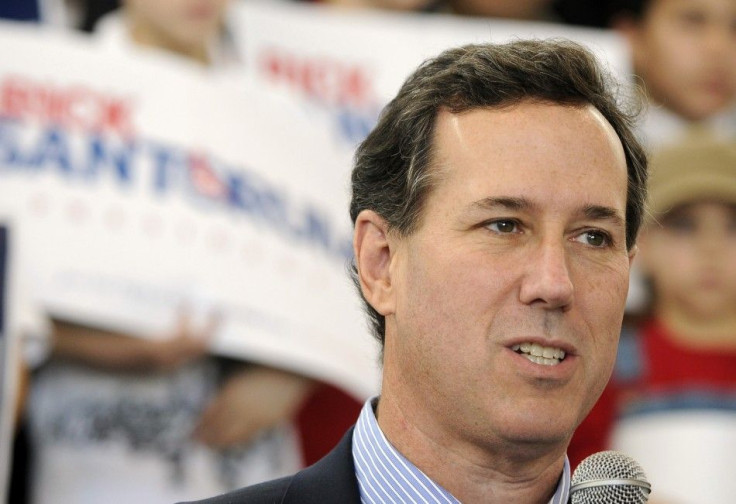Santorum Education: Praise for Homeschooling Reflects Push for Limited Government

Getting the government out of education has become a recurring theme during this Republican presidential primary.
Some of the candidates have vowed to eliminate the federal Department of Education. At the most recent debate, Rick Santorum and Mitt Romney condemned No Child Left Behind, an education overhaul championed by President George W. Bush that enlarged the federal government's involvement in education.
No Child Left Behind initially drew wide bipartisan support, including the vote of then-Senator Santorum (when criticizing Santorum for his vote, Romney neglected to mention he had also backed the law), and Santorum the candidate has eagerly disavowed that stance.
In doing so, the former Pennsylvania senator has repeatedly extolled the merits of homeschooling. In a speech to the Ohio Christian Alliance, he praised a bygone era when parents educating children was commonplace, before the erection of schools that he likened to big factories.
Yes, the government can help, Santorum said, but the idea that the federal government should be running schools, frankly much less that the state government should be running schools, is anachronistic.
Santorum touched on the theme again during the Republican presidential debate, touting his own experience educating his children (he neglected to mention a controversy over revelations that he had paid for it with public dollars).
Look, I'm a home schooling father of seven, Santorum said. I know the importance of customized education for our children. I know the importance of parental control of education.
Santorum: Big Home Schooling Advocate, but Not the First
While Santorum has emerged as perhaps the most prominent advocate of home schooling during the 2012 election, he is not the first candidate to have invoked the practice. Rep. Michele Bachmann, R-Minn., cast the practice in terms of individual liberty during a March speech to a rally in support of home-schooling.
The family has a level of authority that the government may have trampled on, Bachmann said. We need to make sure that families enjoy their untrammeled right without state interference.
Statistics on home schooling are murky because many homeschoolers resist government oversight and data collection. Nevertheless, the data that is available shows steady growth in the number of students who learn at home - the most recent finding from the National Center for Education Statistics placed the figure at about 1.5 million in 2007, a 74 percent increase from 1999.
That trend precedes the rise of the Tea Party movement, but their shared emphasis on limiting government helps explain why Santorum has been eager to cite his homeschooling credentials on the campaign trail.
The idea that parents should have this control and the state has no business intruding, that to me comes from the same source in some ways as the idea that government is an impediment rather than something vital and beneficial to society that I see in a lot of the Tea Party rhetoric, said Robert Kunzman, an expert on homeschooling at the University of Indiana.
Often A Religious Concern
Many parents who choose to homeschool their children have a religious motivation. The National Center for Education Statistics survey found that 83% of parents eschewed conventional schools out of a desire to provide moral or religious instruction, and Kunzman said many parents he has spoken to have emphasized a God-given right and responsibility to direct and guide the upbringing of their children.
At the same time, some homeschoolers may be reacting to the perceived rigidness of a standard education, as the increased emphasis on test scores has increasingly dictated the method and subject of instruction.
In recent years the evidence is starting to accumulate that more people are doing it less for religious reasons and more for pedagogical reasons, said Christopher Lubienski, a professor at the University of Illinois' College of Education. People don't like the type of instruction their kids are getting.
It's not just people who come from a libertarian perspective who argue government shouldn't have a role in education, Lubienski added. It's also people who have seen their schools change because they've become much more focused on a few subjects that are tested.
Holding schools accountable through student test scores was a central component of No Child Left Behind, but the law has not made a dime's worth of difference in increasing rates of homeschooling, according to Michael Farris, chairman of the Home School Legal Defense Association.
All No Child Left Behind shows is that Republicans don't do any better than Democrats at meddling in education, Farris said.
Farris pointed to a longstanding article of faith for homeschoolers that centralized decision making doesn't work and echoed Santorum's call to refocus education policy making on the local level.
Public schools aren't getting any better mainly because the structure you use for making decisions is doomed to failure, Farris said.
--
© Copyright IBTimes 2024. All rights reserved.











